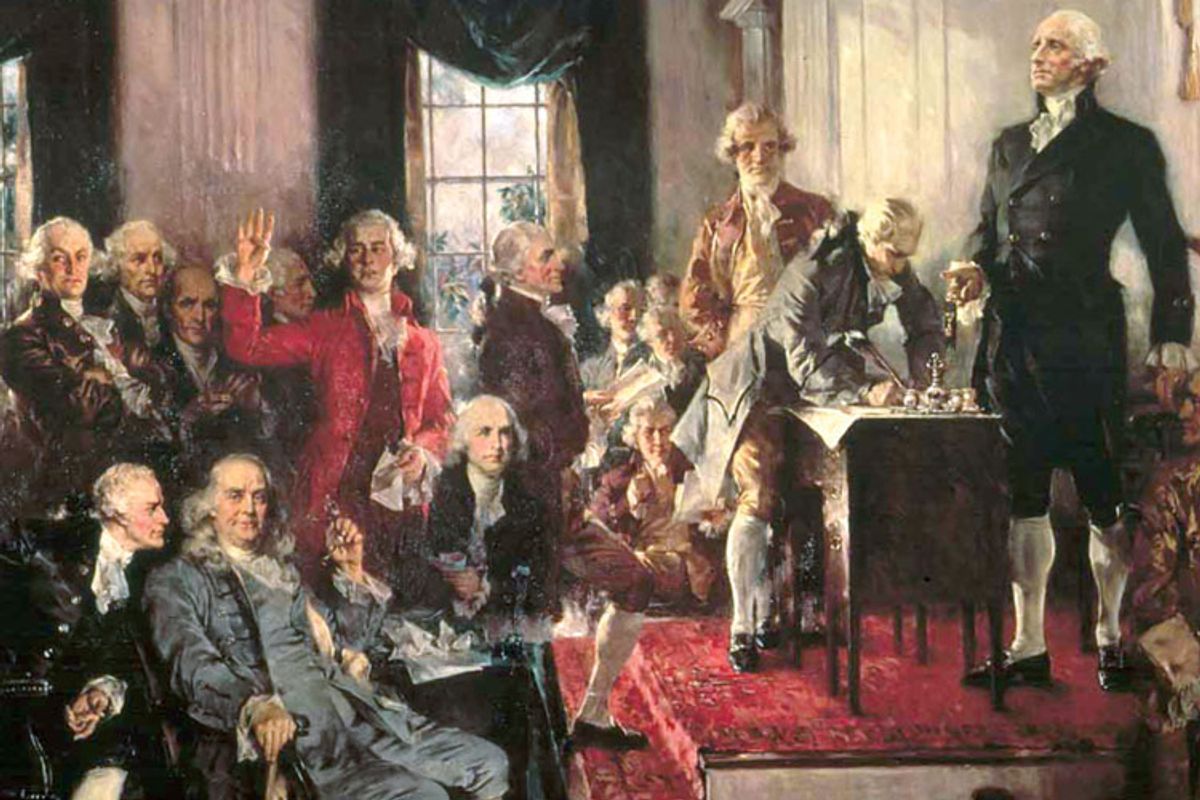This originally appeared at New Deal 2.0
In a critical and entertaining portrait of the anti-tax activist Grover Norquist, the New York Times columnist Frank Bruni presented Norquist as an absolutist obsessed with forcing modern political life to conform to ideas that Norquist associates with the American founders’ first principles.
Of course, Norquist is by no means alone in taking that position. That the Constitution came into existence to keep taxes low, the federal government small, and national debt at zero is an article of faith among many who, like Michele Bachmann, have taken to calling themselves "constitutional conservatives." And faith is required to believe it, as the Norquist interview shows. To make his supposedly constitutional argument, Norquist cites the First Amendment on freedom of religion and the Second on the right to keep and bear arms, and then goes on to cite absolutely nothing, in either the articles or the amendments, that so much as hints at a constitutional requirement to balance the federal budget, avoid debt, tax no more than people like Norquist deem appropriate, and keep government small.
He can’t cite anything to that effect because while balancing budgets, restraining borrowing, and keeping taxes low and government small might be good goals, depending on what you mean by them, it is impossible to locate in the founding national law any requirement to accomplish them. Indeed, the reality of founding history leads to the reverse conclusion.
The Constitution came about precisely to enable a newly large government -- a national one — to tax all Americans for the specific purpose of funding a large public debt. Neither Alexander Hamilton nor his mentor the financier Robert Morris made any bones about that purpose; James Madison was among their closest allies; and Edmund Randolph of Virginia opened the Constitutional Convention by charging the delegates to redress the country’s failure to fund -- not pay off, fund -- the public debt, by creating a national government.
Beginning during the War of Independence, and continuing throughout the 1780s, American nationalists committed themselves to a small class of upscale high financiers (largely identical with the American nationalists), who had bought bonds from the confederation Congress in hopes of earning regular, tax-free, 6 percent interest payments -- not in the Congress's crashing paper currency but in hard, cold metal or its equivalent, stable bills of exchange. Morris, Hamilton, Madison and others believed that swelling the debt to immense proportions would make a coherent nation out of 13 squabbling states and make that nation a player on the world economic stage. Their plan to do so depended partly on making military-officer pay a pension, thus turning the entire officer class into public bondholders -- and giving Congress new power to tax all Americans to support that debt.
Hamilton is often reflexively presented as finding inventive ways to pay down the national debt. His real accomplishments were of course "funding and assumption" -- absorbing the states' war debts in the federal one and funding that huge obligation via nationally collected and nationally enforced taxes.
Hence the all-important provisions of the Constitution giving Congress very broad powers to tax and acquire debt. To 18th-century American nationalists across the political spectrum -- to our founders and framers, that is, from Hamilton to Madison, from Morris to Randolph, from the financiers to the planters -- national taxing and borrowing were ineluctably connected to the very purpose of national government.
Nobody has to like it. But the original intent of the Constitution involved sustaining and managing public debt via taxation.
Both the articles and the amendments do, of course, limit government and restrict its power. But no ratified amendment has ever qualified Congress’s power of the purse, which in the minds of the framers explicitly involved the power to take on debt and fund it. In their tweets and blogs, "constitutional conservatives" have been promoting a balanced-budget amendment with reference to the tired notion that since households and small businesses must balance their budgets (as if!), government must too. They link that economically useless prescription to the widespread fantasy that our Constitution was written, amended and ratified for just such a purpose. The framers saw it just the other way.
But really everybody, not just "constitutional conservatives," buys into the fantasy now. History is rarely helpful politically. It’s hard to imagine liberals bringing to debt-ceiling and balanced-budget debates the painful realpolitik of our national origins, which show the Constitution existing, originally, to finance the investing class and yoke that class's interest (in every sense) to national power. Thus the Times gives the Bruni piece a headline referring to Norquist’s "dangerous purity" -- as if the danger in Norquist's approach lies in a too-rigid insistence on basic principle. There’s nothing purist about Norquist. Whether his ideas may be proven right or proven wrong, they are anything but originalist. Like those of Bachmann and the rest of the anti-tax right, Norquist’s principles are novel, innovative and weirdly postmodern, extra-constitutional at best.
Stark realism about the actual founding purposes of the Constitution will always have limited use in political debate. But it would be nice, at least -- though unlikely -- if we would argue these issues on their merits, and leave the Constitution alone.
William Hogeland is the author of the narrative histories "Declaration" and "The Whiskey Rebellion" and a collection of essays, "Inventing American History." He has spoken on unexpected connections between history and politics at the National Archives, the Kansas City Public Library, and various corporate and organization events. He blogs at http://www.williamhogeland.com.

Shares